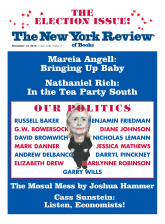In response to:
For an Economic Boycott and Political Nonrecognition of the Israeli Settlements in the Occupied Territories from the October 13, 2016 issue
To the Editors:
A statement recently published in The New York Review of Books calls for “an Economic Boycott and Political Nonrecognition of the Israeli Settlements in the Occupied Territories” [Letters, October 13].
We welcome the statement’s shattering of the taboo against boycotting Israeli entities that are complicit in—at least selective—violations of Palestinian human rights.
Defying common sense, however, the statement calls for boycotting settlements while letting Israel, the state that has illegally built and maintained those settlements for decades, off the hook.
Moreover, shouldn’t Israeli banks that are not based in settlements but finance their construction be targeted as well? This is what the United Methodist Church and the massive Dutch pension fund PGGM have done.
By omitting Israel’s other serious violations of international law, the statement fails the moral consistency test. Aren’t Palestinian refugees, the majority of Palestinians, entitled to their UN-stipulated rights? Shouldn’t Palestinian citizens of Israel enjoy equal rights by repealing Israel’s dozens of laws that racially discriminate against them?
Palestinian civil society has called for Boycott, Divestment and Sanctions (BDS) against all entities, Israeli or international, that are complicit in denying Palestinians everywhere their rights. As the apartheid South Africa boycott shows, this is the most effective, nonviolent way to achieve freedom, justice, and equality for all.
Angela Y. Davis, Distinguished Professor Emerita, History of Consciousness and Feminist Studies, University of California Santa Cruz, California; Chandler Davis, Professor of Mathematics, University of Toronto, Toronto, Canada; Richard Falk, Professor of International Law Emeritus, Princeton, Santa Barbara; Rashid Khalidi, Edward Said Professor of Modern Arab Studies, Columbia University, New York City; Alice Rothchild, MD, Retired Assistant Professor of Obstetrics, Gynecology and Reproductive Biology, Faculty of Medicine, Harvard University, Seattle; Joan W. Scott, Professor Emerita, Institute for Advanced Study, Princeton; Alice Walker, Writer, New York City; Roger Waters, Musician, New York City; and 117 others
Todd Gitlin, David Abraham, and Kai Bird reply:
We seek a just and secure resolution of the Israel–Palestine conflict, one that provides sovereignty, justice, and security to both peoples. There are, of course, issues that our call did not address but about which we agree: equal rights for all citizens of the State of Israel; compensation and justice for Palestinian refugees. Meanwhile, although purporting to reflect the views of “Palestinian civil society,” too many supporters of the Boycott, Divestment and Sanctions agenda embrace a one-state solution that seeks to extinguish the state of Israel. To the contrary, we believe that neither people wishes to forgo a state of its own, and that a “one-state solution” is no solution at all, but rather a prescription for endless violence.
As for our campaign, we hope that a targeted boycott of Israeli settlements and an end to tax subsidies will help persuade the Israeli electorate to reject the costly and wrongheaded settlement enterprise and get serious about a two-state solution, which remains the reasonable prerequisite for justice and peace. We urge those who share our view to join over 240 signatories at Partners for a Progressive Israel, bit.ly/2cSddKz.
This Issue
November 10, 2016
Inside the Sacrifice Zone
Why Be a Parent?
Kierkegaard’s Rebellion



